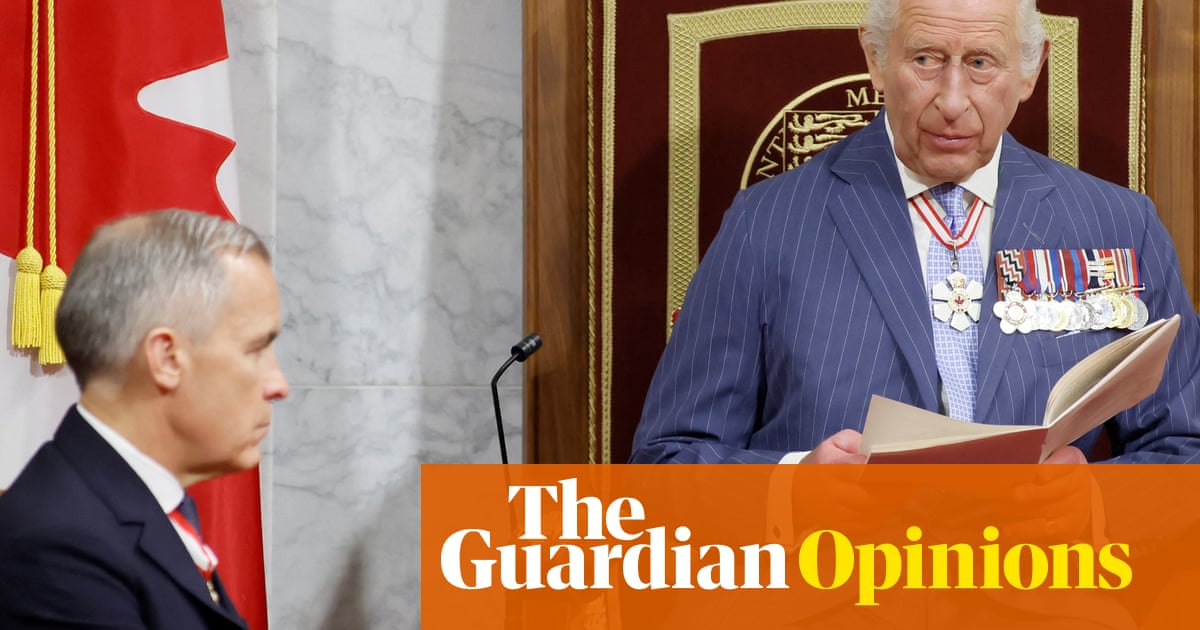Rest assured that the residents of Canada are vulnerable to the same strand of lazy republicanism that tends to afflict most other constitutional monarchies when complacency permits.Monarchy, after all, is irrational and expensive. And of course in a modern society, why should anyone be elevated to positions of power or prestige solely by accident of birth? Add to this absurdity the notion of a “King of Canada” – a fully independent G7 nation – who lives an ocean away, and the silliness of our system of government compounds.
In ordinary circumstances, a British monarch has little interest in a former far-flung colony, and our passport offices would run with or without his official portrait overseeing the grey walls of officialdom. Humans, however, are not rational. And our circumstances are not ordinary.
At moments of closeness or crisis – for example, the visit byKing Charles IIIto deliver a speech from the throne at the opening of Canada’s parliament as our US neighbours are expressing expansionist tendencies – watch all that latent scepticism melt away. When a royal actually lands in Canada, the queues dutifully form as the more transcendent benefits of monarchy become apparent.
Since his election last November, the US president,Donald Trump, has enacted punishing tariffs against Canada’s auto sector, an industry that is highly integrated with the US, undermining a crucial trade relationship that has been the bedrock of this country’s economy for decades. Further, Trump has mused publicly and privately about making Canada the “51st state”, even going so far as to threaten “economic force” to coerce Canadians into consent for the idea.
Canadian voters took the US shift in course seriously, as evidenced by Mark Carney winning a near-majority in parliament – in part by noting that the relationship between the US and Canada, “based on deepening integration of our economies and tight security and military cooperation, is over”. Carney was the“elbows-up”candidate, encouraging Canadians to think of the threat posed by the US in existential terms.
So it is not only an incredible coup, but also a remarkably subtle bit of geopolitics for the new prime minister to open his parliament with a throne speech delivered by the king. The timing of this tour cannot be totally removed from the politics of the world around it.
King Charles III is a potent symbol of Canada’s history and system of government; a system and government that stand in contrast to the flailing republicanism of the US.
The monarchy is a distinctly Canadian symbol, free of partisan affiliation, and thus an institution all Canadians can celebrate after a rancorous election, regardless of which party they voted for.
Even the Conservatives who proudly hung black “Fuck Trudeau” flags in their windows can show up with mini-Canada flags to welcome Charles. This gives the impression of a country united in its sense of self in the face of a leering US threat.
The throne speech will also signal to Canadians that we still have friends in the world beyond the US; that there remains some whisper of a Commonwealth that can, at a minimum, demonstrate moral support. To this end, the king is stepping up at a time when many elected leaders of western nations have remained conspicuously silent at the prospect of a belligerent US threatening its closest friend and ally during late-night rambles on Truth Social.
Given Trump’s penchant for trolling, it’s impossible to know how seriously to take his threats. It’s very unlikely that the Americans are capable, organised, or focused enough to revive long-discarded rhetoric about manifest destiny, or to dig up the decaying military books detailing War Plan Red –secret documentsproduced in the 1920s and 30s intended to prepare for a war with the British empire via Canada.
Even if a military campaign is out of the question, Trump has scrambled Canada’s sense of place in the world. And here, the mere presence of the king must be taken as a reminder of the nation’s history and alliances.
In his opening remarks, Charles alluded to the crown as “a symbol of unity for Canada. It also represents stability and continuity from the past to the present”. Much of the following address – provided by the Canadian government, as it also is in Britain – was, as throne speeches tend to be, filled with the quotidian.
However, it made clear that today, “Canada faces another critical moment. Democracy, pluralism, the rule of law, self-determination and freedom are values which Canadians hold dear”.
It noted the changing relationship between Canada and the US, nodding to the desire of their respective leaders to provide “transformational benefits for bothsovereignnations”, emphasis my own.
And it could have an unintended effect on Trump himself, who has has shown a penchant for autocratic leaders and for pomp and ceremony. Though constitutional monarchy is entirely for show, this distinction may be mostly lost on Trump, who wasobviously flatteredby an invitation by King Charles to a state dinner. Trump described the king as a “beautiful man, a wonderful man”, upon receiving the letter two months ago.
After all, is there anyone on earth better equipped to deliver flattery, pomp, ceremony and elaborate trim detail than a British king?
If it works to soothe the ego of our neighbour to the south, I won’t begrudge the King of Canada’s portrait on everything, rational or not.
Jen Gerson is a Canadian commentator and co-founder of The Line. She lives in Calgary, Alberta
